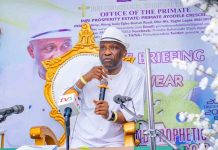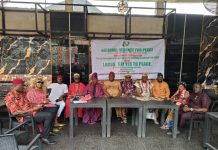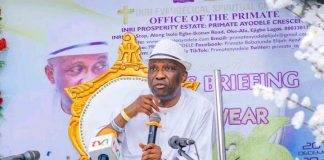Lagos State Governor, Babajide Olusola Sanwo-Olu, has reaffirmed his administration’s commitment to achieving Universal Health Coverage, announcing the signing of an Executive Order making health insurance mandatory for all residents of Lagos State.
Sanwo-Olu affirmed this today at the maiden edition of the 2025 Eko Health Convention, organized by the Lagos State Ministry of Health, with the theme “Lagos Health: Driving Innovation, Strengthening Systems, Leading Change,” held at Jewel Aeida, Lekki.
The Governor, who was represented by the Deputy, Dr. Kadri Obafemi Hamzat, noted that the signing is in line with the National Health Insurance Act, ensuring that every Lagosian contributes according to their ability and enjoys protection when they need care.
His words, “When we launched the Ilera Eko health insurance scheme in February 2021, we made it clear that universal health coverage requires a reliable and inclusive system. In July 2024, I signed an Executive Order making health insurance mandatory for all residents of Lagos State. Some may ask why health insurance should be mandatory. The answer is simple: without a shared pool of resources, universal coverage is impossible. When everyone participates, we protect families from financial hardship, strengthen hospitals, and make healthcare stable and equitable for all.”
The Governor stated that for health insurance to be impactful, it must be backed by a strong emergency response, highlighting that the Lagos State Government through Lagos State Ambulance Service (LASAMBUS) has continued to strengthen the backbone of its emergency medical system, ensuring that the promise of ILERA EKO is matched by the ability to respond swiftly, efficiently, and compassionately when lives are on the line.
“These attempts affirm our conviction that timely and efficient emergency care must be a right, not a privilege. The Lagos Emergency Medical Blueprint is already saving lives. Today, Lagos boasts 360 public health facilities and more than 3,500 private ones, forming a unified ecosystem where public and private providers work side by side to bridge divides, expand access, and uphold the promise of a truly integrated healthcare system for every resident,” Sanwo-Olu said.
Sanwo-Olu, therefore, called on health stakeholders to deepen investment in innovation, expand corporate social responsibility, and reimagine the future of healthcare through technology, creativity, and service, ensuring a system where access is determined not by income, but by need.
He added that good health is a shared responsibility, and that the progress in healthcare will only endure through partnership and the collective effort of every sector, every profession, and every citizen, stressing that it is a collective task not only to hold government accountable, but also to hold ourselves accountable and enroll in health insurance, participate in vaccination campaigns, eliminate mosquito breeding sites, report quackery, adopt healthy lifestyles, and demand quality care wherever it is seek.
Furthermore, he said that since its inception, his administration has placed Health and Environment at the heart of its THEMES agenda, stressing that his government made a promise to Lagosians to build a health system that is accessible, affordable, innovative, and of the highest quality.
He highlighted major achievements under his administration, including the commissioning of new Maternal and Child Centres in Eti-Osa, Badagry, and Epe; the renovation and expansion of General Hospitals; and the construction of critical health facilities such as the New Massey Street Specialist Children’s Hospital, the Ojo General Hospital, the Lagos State Mental Health Institute in Ketu-Ejirin, and the Cardio-Renal Centre in Gbagada.
In his address, Commissioner for Health, Prof. Akin Abayomi, stated the new health blueprint of the state government will transform Lagos into Africa’s powerhouse, reducing mortality rates and boosting economic growth through a bold and data-driven overhaul of the health system.
Prof. Abayomi noted that currently Lagos loses about $1.5 billion annually to outbound medical tourism, an amount he stated is greater than the state’s health budget, stressing that the new health transformation blueprint aims to build world-class facilities, expand health insurance coverage, and create jobs in the medical and biotech sectors.
According to him, “The Governor’s blueprint includes climate-resilient hospital designs, modern general hospitals, a 500-bed psychiatric and rehabilitation centre, and the establishment of Lagos State University of Medicine and Health Science. It also introduces a Smart Health Information Platform (SHIP), a digital system linking all public hospitals and primary health centers for efficient data sharing and decision-making. Our goal is clear. Lagos must become the health capital of sub-Saharan Africa, not just for Nigerians, but for the continent.”
The Commissioner added that Africa needs to build facilities that are environmentally sustainable, technologically advanced, and globally competitive, adding that the plan could help reduce Nigeria’s dependency on foreign medical care while positioning Lagos as a hub for healthcare innovation and medical tourism.
In her opening address, Special Adviser to Lagos State Government on Health, Dr. Kemi Ogunyemi, underscored the importance of collaborative efforts in reshaping the health landscape of Lagos State, affirming that the state government is resolute in its pursuit of ensuring quality, affordable healthcare for all residents.
According to Dr. Ogunyemi, “Our objectives and visions are clear; we want to educate and empower our citizens to take full control of their health and wellness. We want to ensure that the health service we provide is of quality for every single person who lives in Lagos and the citizens of Lagos, because we want to improve the health service in Lagos. Therefore, we believe in collaboration, which is through the Public Private Partnership (PPP), because we, as government, know we cannot do it ourselves.”















